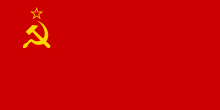
Back الاتحاد السوفيتي في الألعاب الأولمبية Arabic СССР Олимпия уйындарында Bashkir یەکێتیی سۆڤیەت لە ئۆڵۆمپیاد CKB Sovjetunionen ved OL Danish Olympische Geschichte der Sowjetunion German Unión Soviética en los Juegos Olímpicos Spanish Neuvostoliitto olympialaisissa Finnish Union soviétique aux Jeux olympiques French Unión Soviética nos Xogos Olímpicos Galician ברית המועצות במשחקים האולימפיים HE
| Soviet Union at the Olympics | |
|---|---|
 | |
| IOC code | URS |
| NOC | Soviet Olympic Committee |
| Medals Ranked 2nd |
|
| Summer appearances | |
| Winter appearances | |
| Other related appearances | |

The Union of Soviet Socialist Republics (USSR) first participated at the Olympic Games in 1952, and competed at the Summer and Winter Games on 18 occasions subsequently. At six of its nine appearances at the Summer Olympic Games, the Soviet team ranked first in the total number of gold medals won, second three times, and became the biggest contender to the United States' domination in the Summer Games. Similarly, the team was ranked first in the gold medal count seven times and second twice in its nine appearances at the Winter Olympic Games. The Soviet Union's success might be attributed to a heavy state investment in sports to fulfill its political objectives on an international stage.[1]
Following the Russian Revolution of November 1917 and the Russian Civil War (1917–1922), the Soviet Union did not participate in international sporting events on ideological grounds;[2] however, after World War II (1939–1945), dominating the Olympic Games came to be seen by Soviet officials and leaders as a useful method of promoting communism.[3] The Olympic Committee of the USSR was formed on April 21, 1951, and the IOC recognised the new body in its 45th session (May 7, 1951). In the same year, when the Soviet representative Konstantin Andrianov became an IOC member, the USSR officially joined the Olympic Movement.
The 1952 Summer Olympics in Helsinki thus became first Olympic Games for Soviet athletes. On July 20, 1952 Nina Romashkova won the first Olympic gold medal in the history of Soviet sport, competing in the women's discus throw. Romashkova's result in this event (51.42 m) was the new Olympic record at that time.
The 1956 Winter Olympics in Cortina d'Ampezzo became the first Winter Olympic Games for Soviet athletes. There Lyubov Kozyreva won the first Winter Olympic gold medal in the history of Soviet sport, competing in the women's cross-country skiing 10 km event.
The USSR became the host nation for the 1980 Summer Olympics in Moscow. The United States and many other countries boycotted these Games in protest of the Soviet invasion of Afghanistan; the USSR led a boycott of the 1984 Games in Los Angeles.
Although the USSR ceased to exist on December 26, 1991, The Olympic Committee of the USSR formally existed until March 12, 1992, when it disbanded.[4]
In 1992, 7 of the 15 former Soviet Republics competed together as the Unified Team and marched under the Olympic Flag in the Albertville Games, where they finished second in the medal rankings. The Unified Team also competed in the Barcelona Games later in the year (represented by 12 of the 15 ex-Republics), and finished first in the medal rankings at those Games.
- ^ "The Role of Sports in the Soviet Union | Guided History".
- ^ Keys, Barbara J. (2006), Globalizing Sport: National Rivalry and International Community in the 1930s, Harvard University Press, Cambridge, Massachusetts, ISBN 0-674-02326-9 (p. 159)
- ^ O'Mahony, Mike (2006), Sport in the USSR: Physical Culture—Visual Culture, Reaktion Books Ltd, London, ISBN 1-86189-267-5 (p. 19)
- ^ "WHAT HAPPENED TO THE SOVIET OLYMPIC COMMITTEE?". Retrieved 1 January 2024.
© MMXXIII Rich X Search. We shall prevail. All rights reserved. Rich X Search